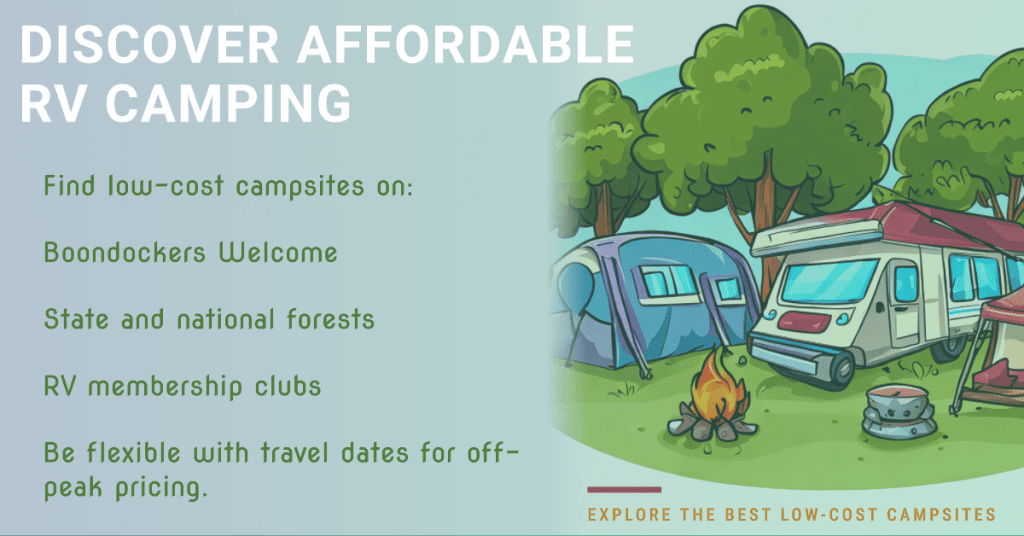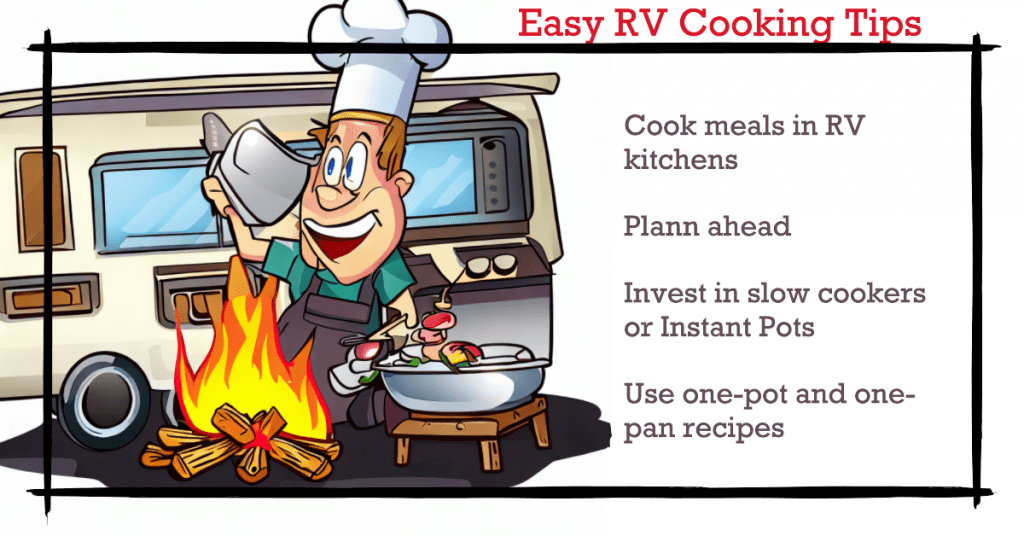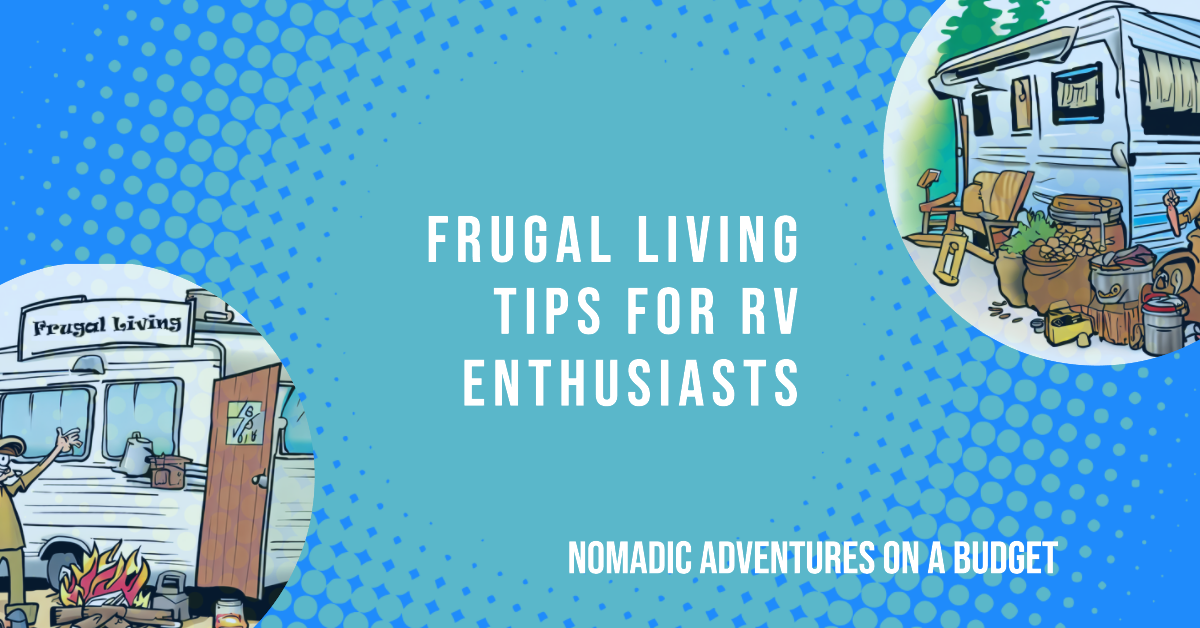Hello there, fellow RV enthusiast! If you’re like me, the call of the open road and the freedom of life on wheels is simply irresistible. Whether you’re a full-time RVer or a weekend warrior, you know that this lifestyle is more than just a hobby – it’s a way of life. But it can be a bit expensive, right? Fear not, for I’m here to share some frugal living tips to help you embark on your nomadic adventures without breaking the bank.
Table of Contents
Hitting the Road on a Budget
Before we dive into the nitty-gritty, let’s start with some basic concepts that will help you embrace the frugal RV lifestyle.
| Budgeting Basics | Frugal Fundamentals |
|---|---|
| Create a budget | Prioritize your spending |
| Track expenses | Set savings goals |
| Build an emergency fund | Practice smart shopping |
| Cut unnecessary costs | Embrace a minimalist mindset |
Budgeting 101
The foundation of frugal living for RV enthusiasts is a well-structured budget. This will help you understand your financial situation and make informed decisions about your spending. There are various apps and tools available, like Mint or YNAB, to help you create and manage your budget.
Sample Budget Worksheet:
| Category | Budgeted Amount | Actual Spending |
|---|---|---|
| Fuel | $ | $ |
| Campsite Fees | $ | $ |
| Maintenance and Repairs | $ | $ |
| Groceries | $ | $ |
| Dining Out | $ | $ |
| Entertainment | $ | $ |
| Utilities (Water, Electric, Gas) | $ | $ |
| Insurance | $ | $ |
| Miscellaneous | $ | $ |
| Savings | $ | $ |
| Emergency Fund | $ | $ |
Additional Tips for Budgeting:
- Create Categories: Divide your budget into categories like fuel, maintenance, groceries, and entertainment. This detailed approach helps you see where your money is going.
- Use Envelopes: If you struggle with overspending in certain categories, consider using the envelope method. Allocate a specific amount of cash to each category, and when it’s gone, it’s gone.
Prioritizing Your Spending
When it comes to RV life, prioritizing your spending on essentials like maintenance, gas, and campsite fees is crucial for a successful budget. Allocating your budget according to your personal preferences and priorities allows you to make the most of your resources. Fancy gadgets or eating out might need to take a back seat to fund your next adventure.
Additional Tips for Prioritizing Spending:
Emergency Fund Worksheet:
| Emergency Fund Goal | Current Balance | Amount to Save Monthly |
|---|---|---|
| RV Repairs | $ | $ |
| Medical Emergencies | $ | $ |
| Unexpected Travel Costs | $ | $ |
| Vehicle Breakdown | $ | $ |
| Pet Emergencies | $ | $ |
Calculate your emergency fund goals based on your estimated monthly expenses and create a plan to reach them over time.
Additional Tips for Building Your Emergency Fund:
- Start small and gradually increase your monthly contributions to the emergency fund as your financial situation improves.
- Consider setting up an automatic transfer from your checking account to your emergency fund savings account to ensure consistent contributions.
Savings Goals Worksheet:
| Savings Goal | Target Amount | Monthly Savings Goal |
|---|---|---|
| RV Adventure | $ | $ |
| RV Upgrades | $ | $ |
| Travel Fund | $ | $ |
| Emergency RV Fund | $ | $ |
| Retirement Fund | $ | $ |
Set clear savings goals for your RV adventures, upgrades, a travel fund, an emergency RV fund, and a retirement fund, and establish a plan to achieve them.
Additional Tips for Achieving Your Savings Goals:
- Break down your savings goals into smaller, manageable milestones. Celebrate your progress when you reach each milestone.
- Consider opening a dedicated savings account for each goal to prevent accidentally spending the money earmarked for your adventures, upgrades, or long-term financial security.
Making the Most of Your Resources
Frugality in the RV lifestyle isn’t about living in deprivation; it’s about optimizing your resources for a richer experience.
| Optimizing Resources | Being Resourceful |
|---|---|
| Plan your routes carefully | Learn DIY RV maintenance |
| Find free or low-cost campsites | Cook your meals |
| Invest in energy-efficient upgrades | Save water and electricity |
| Network with other RVers | Practice “boondocking” |
Efficient Route Planning
Plan your routes to minimize fuel consumption. Apps like Roadtrippers or RV Trip Wizard can help you find the most scenic and cost-effective paths.
Additional Tips for Efficient Route Planning:
- Research fuel-efficient routes before hitting the road to optimize your gas mileage.
- Utilize GPS apps and devices specifically designed for RVs to avoid low-clearance bridges and other road hazards.
Low-Cost Campsites

Consider using platforms like Boondockers Welcome or Harvest Hosts, where you can find free or low-cost campsites. Alternatively, state and national
forests often offer budget-friendly camping options.
Additional Tips for Finding Low-Cost Campsites:
- Join RV membership clubs like Passport America or Good Sam Club for discounted campsite fees.
- Be flexible with your travel dates to take advantage of off-peak pricing at campgrounds.
Energy-Efficient Upgrades
Invest in energy-efficient upgrades for your RV, such as LED lighting, solar panels, and efficient appliances. These investments will save you money in the long run.
Additional Tips for Energy Efficiency:
- Consider adding insulation to your RV to reduce the need for heating and cooling.
- Upgrade your thermostat to a programmable model that can help regulate your RV’s temperature.
Networking with Other RVers
Connect with fellow RV enthusiasts to learn from their experiences and share cost-saving tips. Joining online forums and social media groups can be a valuable resource.
Additional Tips for Networking:
- Attend RV rallies and gatherings in your area to meet other RVers and exchange information.
- Create a network of RV friends you can rely on for advice and support.
DIY Solutions
Embrace DIY for minor RV repairs and maintenance. There are tons of resources online, and YouTube can be your go-to guru for fixing common issues.
Additional Tips for DIY Maintenance:
- Create a well-organized toolkit with essential tools and spare parts to handle common RV repairs on the go.
- Attend DIY workshops or seek advice from experienced RVers to enhance your repair and maintenance skills.
Upcycling and Repurposing
Get creative and repurpose items you already have. An old ladder can become a unique bookshelf, and mason jars can serve multiple purposes from food storage to DIY lanterns.
Additional Tips for Upcycling and Repurposing:
- Look for inspiration in RVing and tiny house communities, where space-saving and creative solutions are highly valued.
- Share your upcycling ideas and projects with fellow RVers, inspiring others to reduce waste and save money.
Maximizing Savings on Supplies
Now, let’s talk about how to save money on your everyday needs.
| Grocery Shopping | Economical Eating |
|---|---|
| Buy in bulk | Cook in batches |
| Use loyalty programs | Plan your meals |
| Opt for generic brands | Eat local and seasonal |
Economical Grocery Shopping
Join loyalty programs at grocery stores to enjoy discounts and promotions. And always buy non-perishable items in bulk to save money.
Additional Tips for Economical Grocery Shopping:
- Create a grocery list and stick to it to avoid impulse purchases.
- Compare prices at different stores and take advantage of special discounts and coupons.
Cooking on a Budget

Cook your meals in your RV kitchen. Batch cooking and planning your meals ahead of time can save you a bundle. Invest in a slow cooker or an Instant Pot for efficient cooking.
Additional Tips for Cooking on a Budget:
- Explore one-pot and one-pan recipes to minimize dishwashing and save on water.
- Plan meals that use similar ingredients to reduce food waste and simplify your shopping list.
Use Technology Wisely
Leverage technology to find deals and stay connected. Use apps like GasBuddy to find the cheapest fuel in your area and Google Maps to locate nearby free amenities like dump stations and fresh water fill-up points.
Additional Tips for Using Technology Wisely:
- Consider using budgeting and expense tracking apps to monitor your spending on the road.
- Install RV-specific apps that provide information on campgrounds, dump stations, and road conditions.
Staying Healthy on the Road
Maintaining your health while RVing can be frugal and fun.
| Healthy RV Living | Fitness and Wellness |
|---|---|
| Prioritize sleep | Explore local outdoor activities |
| Stay hydrated | Find free or low-cost wellness classes |
| Explore local farmers’ markets | Cook healthy meals in your RV |
Prioritize Sleep
A good night’s sleep is essential for overall health. Invest in a comfortable mattress for your RV and establish a bedtime routine to ensure restful nights.
Additional Tips for Prioritizing Sleep:
- Use blackout curtains and eye masks to block out light, especially when camping in well-lit areas.
- Maintain a consistent sleep schedule to regulate your body’s internal clock.
Stay Hydrated
Drinking enough water is crucial, especially in hot climates. Carry reusable water bottles and refill them at campsites or public places to save on bottled water costs.
Additional Tips for Staying Hydrated:
- Flavor your water naturally with slices of fruits like lemon, lime, or cucumber to make it more appealing.
- Monitor your water intake, especially in high-altitude locations, to avoid dehydration.
Explore Local Farmers’ Markets
Support local farmers and enjoy fresh, affordable produce by shopping at farmers’ markets in the areas you visit.
Additional Tips for Farmers’ Market Shopping:
- Bring reusable bags and containers to minimize waste when purchasing fresh produce.
- Engage with local farmers to learn about the region’s unique fruits and vegetables.
Engage in Outdoor Activities
Take advantage of the stunning natural landscapes around you by engaging in outdoor activities like hiking, swimming, and cycling.
Additional Tips for Outdoor Activities:
- Research the best trails and outdoor spots in advance to make the most of your time in each location.
- Join local fitness classes or outdoor adventure groups to meet new people and stay active.
Boondocking: The Art of Frugal RV Camping
Boondocking, also known as dry camping or wild camping, is a budget-conscious RVer’s dream come true. It involves camping off-grid, away from traditional campgrounds and amenities, and instead, relying on your RV’s self-sufficiency. Here, we’ll explore the world of boondocking and how it can be a frugal and rewarding experience.

The Boondocking Lifestyle
Boondocking isn’t just a way to save money; it’s a lifestyle choice that offers unique benefits:
- Cost Savings: Since you’re not paying campsite fees, boondocking can significantly reduce your daily expenses.
- Freedom and Seclusion: Boondocking sites are often in remote and beautiful locations, providing peace and privacy.
- Connection with Nature: You’re closer to nature and can enjoy activities like hiking, fishing, or stargazing.
- Self-Sufficiency: Boondocking encourages you to be more self-reliant, conserving resources like water and electricity.
Finding Boondocking Spots
Discovering the perfect boondocking locations requires some research and knowledge. Here are ways to find these hidden gems:
- Online Resources: Websites and apps like Campendium, FreeCampsites.net, and iOverlander provide user-generated reviews and locations of boondocking spots.
- Bureau of Land Management (BLM) Lands: BLM-managed lands often permit free or low-cost dispersed camping, making them ideal for boondocking.
- National Forests: Many national forests offer dispersed camping areas, allowing you to camp for free or a nominal fee.
- Public Lands: Research public lands, state and national parks, and wildlife management areas that permit boondocking.
Preparing for Boondocking
To make the most of your boondocking experience, you’ll need to prepare your RV and yourself. Here are some tips to get you started:
RV Upgrades
Invest in upgrades to enhance your boondocking capabilities:
- Solar Panels: Solar power can keep your batteries charged, allowing you to run appliances without relying on a generator.
- Lithium Batteries: Upgrade your batteries for longer-lasting power storage.
- Freshwater and Waste Tanks: Increase your freshwater tank capacity and add a portable waste tank for extended stays.
- Inverter: An inverter converts DC power to AC, allowing you to run regular household appliances.
- LED Lighting: Energy-efficient LED lights reduce electricity consumption.
Water and Waste Management
Boondocking requires careful water and waste management:
- Water Conservation: Use water-saving fixtures and collect rainwater for non-potable uses.
- Composting Toilet: Consider a composting toilet to minimize water usage.
- Greywater Management: Dispose of greywater responsibly and within regulations.
Emergency Kit
Prepare an emergency kit for off-grid scenarios:
- First Aid: Stock a comprehensive first-aid kit for injuries and medical emergencies.
- Navigation Tools: Include maps, a GPS device, and a compass.
- Communication: A satellite phone or emergency beacon can be essential for communication in remote areas.
Safety and Security
Prioritize safety during boondocking:
- Research Area: Know the area you plan to camp in and be aware of potential hazards.
- Travel with Others: If possible, boondock with fellow RVers for safety and companionship.
- Cellular Signal Booster: A signal booster can help you stay connected in areas with weak cell reception.
Leave No Trace
While enjoying the benefits of boondocking, it’s crucial to practice responsible and sustainable camping. Follow these principles:
- Pack It In, Pack It Out: Leave no trash behind and dispose of waste properly.
- Respect Local Wildlife: Observe wildlife from a distance and don’t feed them.
- Minimize Campfire Impact: Use a camp stove instead of making a fire and adhere to local fire regulations.
- Stay on Designated Routes: Avoid creating new trails or roads that harm the environment.
- Respect Other Campers: Keep noise levels down and maintain a respectful distance from other campers.
Boondocking offers a unique opportunity to connect with nature and experience a frugal RV lifestyle. With the right preparation and a commitment to responsible camping, you can embark on unforgettable adventures while keeping your budget in check. Happy boondocking!
And there you have it – a comprehensive guide to frugal living for RV enthusiasts. I hope these tips help you make the most of your nomadic adventures while keeping your finances in check. After all, the road ahead is meant to be enjoyed, not fretted over. Safe travels! 🚐🌄
